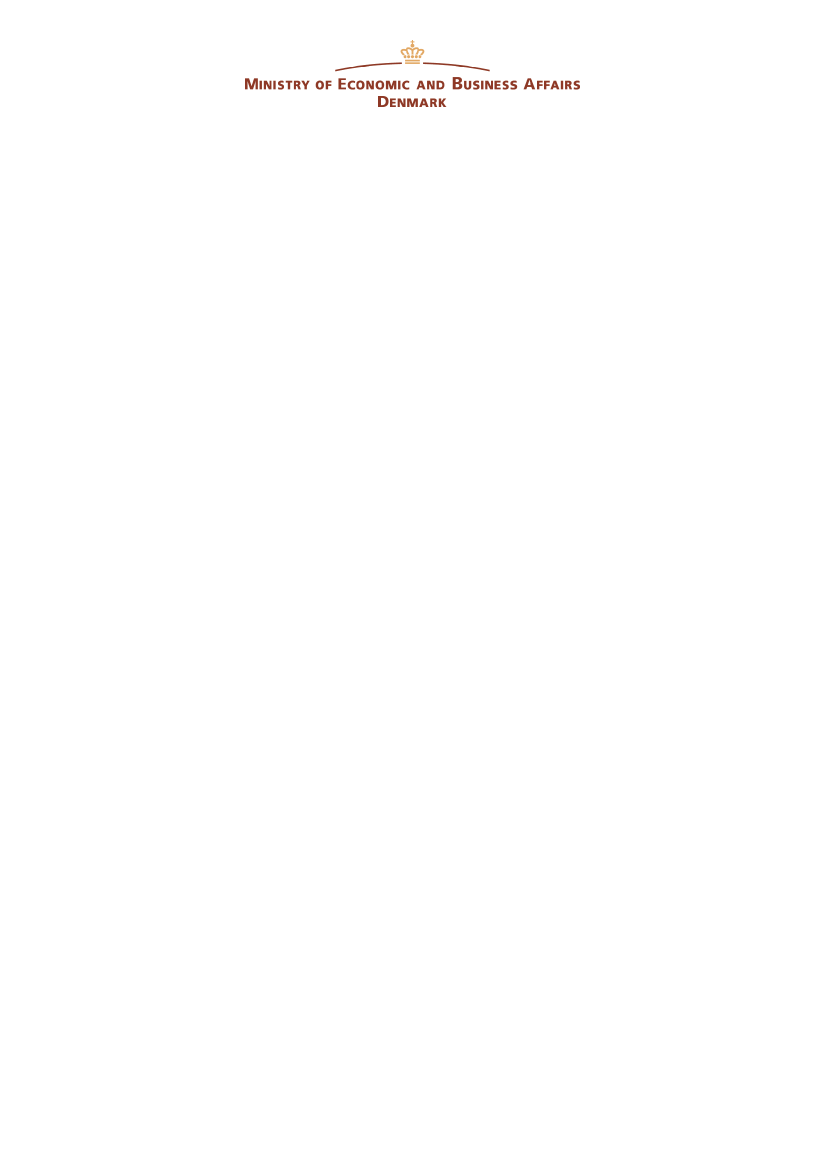Erhvervsudvalget 2010-11 (1. samling)
ERU Alm.del Bilag 218
Offentligt









The Danish Government’s response to the Commission’s Report on the application ofDirective 2004/48/EC on the enforcement of intellectual property rightsIntroductionAs from 11 January 2011 to 31 March 2011 the Commission has launched a consultation onthe Commission’s report on the application of Directive 2004/48/EC of the European Parlia-ment and the Council of 29 April 2004 on the enforcement of intellectual property rights,COM(2010) 779 final, (EvaluationReport)including the relatedStaff Working Document,SEC(2010) 1589 final, and theIssues Paper,6141/11 PI8 Droipen 10 JUSTCIV 17 - Presi-dency questionnaire.This response comprises feedback from the Danish Government on the Evaluation Reportincluding the Staff Working Document and the Issues Paper. As requested by the Commissionthe structure of this response is aligned with the structure of the Issues Paper.The Evaluation Report and The Staff Working Document have also been sent in consultationwith external parties. As recommended by the Commission such parties will provide theiranswers directly to the Commission through the Commission’s consultation portal. Neverthe-less, in this response from the Danish Government the Danish Government has also taken into consideration feedback from external parties.1. Digital environment1.1. Do you consider that IPR infringements over the Internet pose a problem that thecurrent toolbox of Directive 2004/48/EC (Enforcement Directive) is not entirely suitableto handle?IPR infringements over the Internet pose a unique and specific set of challenges. The DanishGovernment therefore supports the Commission’s endeavour to limit the increasing problemof IPR infringements in the digital environment.The internet challenges are comprehensively addressed in specific legislation i.e. the E-Commerce Directive (2000/31/EC) and the Information Society Directive (2001/29/EC).Consequently, this existing regulation should be taken in to consideration when amendmentsto the Enforcement Directive are considered.1.2. What kind of specific measures are in your view suitable to combat such infringe-ments? Which measures should be taken at EU level?The Danish Government supports the Commissions’ endeavours to limit IPR infringements inthe digital environment.In doing so it is important to maintain a broad approach – focus should be given to enforce-ment as well as availability of legal online services, new business models and legal opportuni-ties to download and use copyright protected works in a way easily available for the consum-ers.
Measures that are effective, balanced and proportionate to combat IPR infringements on theInternet should be developed and harmonized at EU level. Such measures should be imple-mented in the most suitable way to address these kinds of infringements. The Danish Gov-ernment urges the Commission to analyse, evaluate and recommend best practice measures,procedures and remedies related specifically to IPR infringements on the internet.The digital environment has become a major forum for distribution of creative content. Thisdevelopment has resulted in new opportunities for innovation and use of creative content aswell as challenges related to IPR-infringements such as illicit file-sharing and other use anddistribution of IPR-protected material without the consent of the right holder.The European Commission has made the creation of a digital single market one of the highestpriorities in Europe’s 2020 flagship initiative the Digital Agenda. The Danish Governmenthas expressed its support to the promotion of legitimate cross-border online services withinthe European Union in its contribution to the European Commissions hearing on CreativeContent in a European Digital SingleMarket.1.3. Is there a need to lay down rules regarding theliability of online service providers(andlimitationsthereto) in the Enforcement Directive beyond those already existing inDirective 2000/31/EC (Directive on electronic commerce)? If yes, is there a need tode-fine the term“online service provider” in the legal framework of intellectual property?Online service providers play an important role when it comes to distribution in the digitalenvironment.The Commission should take in to consideration, that limitations to the liability of online ser-vice providers are regulated in the E-Commerce Directive (2000/31/EC) when the role of in-termediaries is considered in connection with the revision of the Enforcement Directive.1.4. Taking into account the types of data mentioned in Article 8(1) and 8(2) of the En-forcement Directive, is there a need to introduce explicit rules that enable authorities toorderonline service providers,regardless of their liability, todisclose informationrelat-ing toindividual subscriberswho have allegedly committed IP infringement? If yes, whatshould be thepreconditionsandlimitsfor such orders (e.g. infringement has to be on acommercial scale, only judicial authorities may order such measures, infringement pro-ceedings have to be in progress, only certain types of data may be provided, limitationsfor safeguarding rights to privacy and protection of confidential data)? What should bethesanctionfor non-compliance with such orders? Should these measures be limited toIP infringements? (See also question 5.3.)The European Data Retention (2006/24/EC) and Data Protection Directives (95/46/EC and2002/58/EC as amended by 2009/136/EC) are quite specific in their balancing of principlesand exceptions related to data retention for specific purposes and the protection (use anddeletion) of data. Any considerations regarding retention of data for the purpose of disclosinginformation related to IPR infringements should respect these fundamental principles whilealso securing the proportionality of any new obligations related to data retention placed onintermediaries on the internet.1.5. Taking into account the jurisprudence of the European Court of Justice, is there aneed to amend the existing legal framework relating tothe liability or legal obligations of
2/9
online service providers(including search engines and online market places) whose ser-vices are directly used in infringing activities (not necessarily on a commercial scale)? Ifyes, which legal instrument should be amended (the Directive on electronic commerce,the Enforcement Directive or the Trade Mark Directive)?The existing regulation of online service providers’ liability in the E-Commerce Directive(2001/31/EC) should be taken in to consideration when the role of intermediaries is consid-ered in connection with the revision of the Enforcement Directive.1.6. In the case of online copyright infringements, does your law provide for the possibil-ity of taking measures againstwebsites facilitating such infringementsor againstadvertis-ersfinancing such websites? Does your law provide for specific legal measures againstP2P file sharing? Do you see a need for such measures to be included in the EnforcementDirective?The Danish copyright act does not contain specific legal measures against P2P file sharing,since this is covered by the general copyright rules regulating the scope of the copyright pro-tection, which states that copyright implies the exclusive right to control the work by repro-ducing it and by making it available to the public.The rules of the Danish Administration of Justice Act regarding temporary injunctions can beused by the courts to order an ISP to block subscriber-access to websites facilitating onlinecopyright infringements. This has been upheld by the Danish Supreme Court in a ruling from2010.2. Scope of the Directive2.1. Is there a need to apply some (or all) of the measures provided for in the Enforce-ment Directive also with a view to rights that currently are not covered by the Directive?The Danish Government believes that it is not necessary to apply the measures provided for inthe Directive also to rights that are currently not covered by the Directive.2.2. How do you think issues like the protection of trade secrets and domain names andprotection against parasitic copies (look-alike marketing) should be dealt with? Do yousee them as being linked to IPR or do you consider them more an issue of unfair compe-tition law? Would you see an added value of EU action in that area?Protection of trade secrets and domain names and protection against parasitic copies (look-alike marketing) is not seen as being linked with IPR unless one or more of the intellectualproperty rights as defined in the “Statement by the Commission concerning Article 2 of Di-rective 2004/48/EC of the European Parliament and the Council on the enforcement of intel-lectual property rights (2005/295/EC)” (Statement) are infringed in connection with the in-fringement of trade secrets, domain names and marketing rules.2.3. Is there a need to providea list of intellectual property rightsin the Enforcement Di-rective? If yes, what should be the relation of this list to the scope of the Directive (ex-haustive list, indicative list, minimum list)? Should such a list be included in the Articlesor in the recitals? How should rights protected only by certain national laws be treatedin such a list?
3/9
A non-exhaustive list of intellectual property rights in line with the above mentioned State-ment could be developed.3. Evidence3.1. What are the limits of the provisional measures (e.g. search or seizure orders) inrespect of confidential (private) information under your law? Have you encountered anydifficulties in this respect?(a) According to the Danish Administration of Justice Act an order of disclosure etc. cannotbe issued if it will produce information about matters about which the individual would beexcluded or exempted from testifying as a witness pursuant to Sections 169-172, see Section298, Section 299, Section 306, Subsection 4, and Section 653, Subsection 5.According to Sections 169-170, public servants, ministers of religion, defence counsels etc.are as a general rule excluded from testifying about matters to which they are bound to ob-serve professional secrecy.According to Section 171, the nearest relatives of a party are as a general rule exempted fromtestifying. Also according to Section 171 a witness is always exempted from testifying if thetestify presumably exposes the witness to penalty etc. According to Section 172 editors etc.are as a general rule exempted from testifying about source references etc.Finally, according to Section 653, Subsection 4, the court entirely or partly rejects a requestfor a search if the search in consideration of the sanctity of private life, business secrets, orother reasons presumably will harm or cause inconvenience to the alleged infringer in a waythat is disproportionate to the interests of the claimant.Furthermore, the Danish Act on Processing of Personal Data shall apply to processing of per-sonal data in connection with orders of information according to the Danish Administration ofJustice Act Section 306 (which corresponds with Article 8 of the Directive). The person whois ordered to provide information according to Section 306 may process personal data, sincethe processing is necessary for compliance with a legal obligation to which the controller issubject.(b) The Danish Government has no information of difficulties encountered in this respect.3.2. What are the conditions, under your law, toobtain banking, financial or commercialdocuments?The limits mentioned in section 3.1 above also apply to the obtaining of banking, financialand commercial documents. Obtaining these documents is not limited to cases of commercialscale.3.3. Is there a need to ensure thata)personal computerscan be searched/seized in order to establish evidence for an IPRinfringement committed via the Internet?b) screenshotsare accepted by courts as evidence for infringements committed via theInternet?
4/9
Even now the evidence gathering mentioned can be carried out according to the Danish Ad-ministration of Justice Act. Therefore, according to Danish law there is no need to ensure theevidence gathering.3.4. Is there a need to clarify the term “underthe control”relating to evidence in Article6 of the Enforcement Directive?According to the Danish Administration of Justice Act the court can order a party to presentdocuments that are under the control of the opposing party, see Section 298. The party shallstate the facts that the requested documents shall establish, and state the reasons supportingthat the documents are under the control of the opposing party, see Section 300.4. Intermediaries4.1. Is there a need to introduce acommon definition of intermediariesin the Enforce-ment Directive?According to Danish law injunctions against intermediaries have to be requested under thegeneral rules, see section 4.2 below. Therefore, there is no need to introduce a common defi-nition of intermediaries.4.2. Does your law containspecific provisions on injunctions against intermediaries,or dosuch injunctions have to be requested under the general rules? If there are specific pro-visions, what are these and are they used often?Danish law does not contain specific provisions on injunctions against intermediaries. Asmentioned at page 15 in the Staff Working Document injunctions against intermediaries havebeen used according to those general rules.4.3. Is there a need to clarify in the Enforcement Directive that not only permanent in-junctions are available against intermediaries but alsointerlocutory injunctions?Shouldother provisional or precautionary measures be available against intermediaries (seealso question 5.1.)?See section 4.1 and 4.2 above.4.4. Taking into account that certain measures are available against intermediaries evenwhen they cannot be held liable for the infringing acts, is there a need toclarify thestandingof an intermediary in IP infringement proceedings? Can an intermediary bedeemed an “unsuccessfulparty”when an injunction is issued against it without establish-ing its liability for the infringement (e.g. relating to cost issues)?See section 4.1 and 4.2 above.The predictability of the intermediaries and market players’ rights and standing is important.4.5. Should intermediaries (transport service providers, Internet platforms, ISPs) beinvolved to a greater extent in the prevention or termination of IP infringements? If yes,what ways would you deem appropriate?
5/9
Online service providers play an important role when it comes to distribution in the digitalenvironment.The Commission should take in to consideration that the liability of online service providersis regulated in the E-Commerce Directive (2000/31/EC) when the role of intermediaries isconsidered in connection with the revision of the Enforcement Directive.Involvement of intermediaries (e.g. transport service providers, Internet platforms, ISPs) to agreater extent in the prevention or termination of IP infringements should be reasonable andbalanced in relation to their possibilities’ of carrying out their businesses.5. Right of information5.1. Is there a difficulty in applying IP enforcement measures (especially rules on rightof information) together with rules ondata protectionorright to privacyin your country?The Danish Government has no information about difficulties regarding this subject.5.2. What are the limits of the right of information in your country, in view of privacyissues? Is there a need to amend the Enforcement Directive (or other EU legal instru-ments) in order to accommodate such conflicts?As described under section 3.1, the Danish Act on Processing of Personal Data shall apply toprocessing of personal data in connection with orders of information according to the DanishAdministration of Justice Act Section 306 (which corresponds with Article 8 of the Direc-tive). The person who is ordered to provide information according to Section 306 may processpersonal data, since the processing is necessary for compliance with a legal obligation towhich the controller is subject.5.3. Is there a need to clarify that the right of information pursuant to Article 8 of theEnforcement Directive may also be invoked before the infringement (and, where appro-priate, the acts having been carried out on a commercial scale) was established by thejudicial authorities, i.e. thatproviding informationmay also be ordered as aprovisionalmeasure?Is the usefulness of this interpretation in strengthening the IP enforcementframework enough to outweigh that providing information is by definition “irreversi-ble” and that in certain cases the addressees of such orders are third parties (intermedi-aries) not being party to the litigation?According to the Danish Administration of Justice Act Section 306, Subsection 1, the right ofinformation may be invoked in the context of proceedings as foreseen by the directive.5.4. Due to data retention laws, online service providers sometimes do not possess therequested information about the infringements (e.g. it was subject to deletion). At thesame time this information might need to be provided when requested by the public au-thorities. How do online service providers in your country respond to such requestsfrom the public authorities when they are no longer in the possession of the informationneeded?The right holders in Denmark have not reported this as being an issue of concern.
6/9
5.5. Can information that in your country would normally be subject to the banking se-crecy, be requested by using the right of information?See section 3.1 and 3.2 above.6. Commercial scale6.1. Have you defined "commercialscale"in your country – either in law or by juris-prudence? If so, which is the definition that you have chosen?No, see page 5 in the Staff Working Document.6.2. Is the definition of “commercialscale”still appropriate in Recital 14 of the En-forcement Directive? Is there a need to have a definition at all, and if yes, should it bemoved to the Articles of the Directive? Should the link between the commercial scalerequirement and the right of information remain intact?See section 6.1.6.3. The criterion of “commercial scale” (as for its definition, see Recital 14 of the En-forcement Directive) applies to a limited number of specific cases: communication ofbanking or commercial documents [Article 6(2)], right of information towards interme-diaries [Article 8(1)], and seizure of movable and immovable property and blocking ofbank accounts as a precautionary measure [Article 9(2)]. For which of the above men-tioned three situations do you consider thecommercial scale criterion as necessary oruseful?What risks do you see if this criterion were to be abolished?See section 6.1.6.4. If you have made the right of information subject to the commercial scale require-ment, how do you deal with the problem that sometimes therightholder needs additionalinformationfrom an intermediary in order to be able to determine whether the in-fringement has been committed at a commercial scale?See section 6.1.6.5. If under your law commercial scale is not a precondition for ordering the measuresconcerned,has its absence lead to abuses,in certain areas, by right holders? If yes, whichareas are affected?The Danish Government has no information about abuse.7. Damages7.1. Do you see a deficiency in the practice of awarding damages, i.e. in compensatingthe rightholder for damages suffered (including moral prejudice and lost profits)? If yes,is this deficiency due to the current wording of the Enforcement Directive? Would ithelp this deficiency if recovery of unjust enrichment was to be ordered as an objectivesanction (i.e. not depending on the culpability of the infringer), or should unjust enrich-
7/9
ment of the infringer and other economical consequences play a greater role in calculat-ing damages?Case law is still rather limited. In existing Danish judgments damages are often awarded atthe courts’ discretion without being very explicit or detailed on how awarded damages havebeen motivated and calculated.It is important to continue to be entitled to take unjust enrichment of the infringer and othereconomical consequences in to consideration when calculating damages. However, recoveryof unjust enrichment should not be ordered as an objective sanction.Finally, according to information given by the Danish right holders, they often prefer to settledisputes out of court as the damages awarded are rarely deemed proportionate to the costs of atrial.7.2. In your judicial practice, what is the relationship between unjust enrichment andlost profits (i.e. royalties or license fees that would have been due in a contractual rela-tionship)?See 7.1.7.3. What is the legal situation under your law relating to theliability of legal persons(and the managers thereof for the acts carried out by the legal person)? Is there anyIP-specific problemin this respect that could be tackled in the Enforcement Directive?In limited liability companies the management is only liable if it has violated the principle offault.The Danish Government can not support any idea as regarding to extending the liability rulefor the management when it comes to IP-specific matters.8. Corrective measure8.1. In your judicial practice, what is thedifference between “recall” and “definitive re-moval”from the channels of commerce? Is the fact that the infringer isno longer in pos-sessionof the infringing goods a factor in deciding which measure to apply?When products by judgment are “recalled” in Denmark the possibility of using the infringingproducts at a later stage still exist. This could be the situation, if the infringing products arerecalled until the parties for example have negotiated a solution subject to contract, e.g. a li-cense agreement. Further, if a patent for example is just about to expire the products could berecalled until the patent expires.“Definitive removal”is a permanent solution in contrary to recall of products. Definitive re-moval is used if it is not possible only to recall products from the trade.8.2. Is there a need to clarify in the Directivethe relationship between corrective and pro-visional measures?
8/9
If the difference between recall and definitive removal is not interpreted uniformly in allmember states, it could be reasonable to clarify the difference in the Directive as it is ex-plained above.On page 19 in the Staff Working Document the Commission states that among other countriesDenmark uses the discussed recall instrument as a preliminary measure before proceedings.The Danish Government would like to rectify that the discussed recall instrument is only usedby judgment after proceedings in Denmark. However, in connection with the use of the inter-locutory injunction instrument, products can be recalled if the recall can be characterized as asubsidiary (“accessorisk” in Danish) obligation to act compared to the omission obligation(“undladelsespligt” in Danish) that is the main purpose of the interlocutory instrument.8.3. Does it happen frequently that the infringer is not able to pay thecosts of the de-structionand that those therefore have to be borne by the State? Would you consider itjustified to impose the costs for the destruction of counterfeit goods on the State wherethe destruction is in the public interest (in particular because these goods pose a risk toconsumers' health and safety)?The Danish Government has no comments.8.4. Would it improve the situation if the Directive clarified that courts are entitled toimpose the costs of destruction of the infringing goodsdirectlyon the infringer once theinfringement is established?The Danish Government has no comments.8.5. Do you see a need to harmonise aspects ofsecondary use(e.g. for charity purposes)of infringing goods in the Enforcement Directive?In relation to trademark infringements any harmonisation of secondary use should ensure thatsecondary use of goods can not in any way be linked to the infringed trademark.9. Other issuesThe Danish Government has no comments.
9/9









